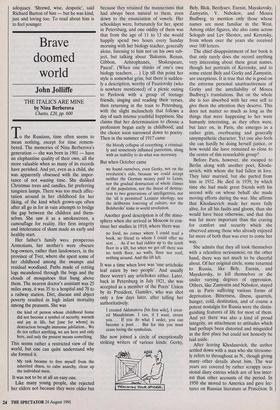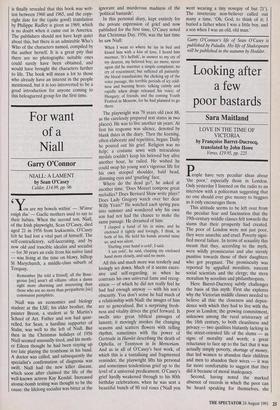Brave doomed world
John Jolliffe
THE ITALICS ARE MINE by Nina Berberova
Chatto, f20, pp. 600
To the Russians, time often seems to mean nothing, except for time remem- bered. The memories of Nina Berberova's generation — she was born in 1901 — have an elephantine quality of their own, all the more valuable when so many of its records have perished. And yet, even as a child, she was apparently obsessed with the impor- tance of not wasting time. She disliked Christmas trees and candles, far preferring tungsten lamps. There was too much affec- tation around in her childhood for her liking, of the kind which grown-ups often after all go in for in vain attempts to bridge the gap between the children and them- selves. She saw it as a smokescreen, a camouflage for reality. Her firm integrity and intolerance of sham made an early and healthy start.
Her father's family were prosperous Armenians, her mother's were obscure bog-owners, rather than landowners, in the province of Tver, where she spent some of her childhood among the swamps and residual woodland. Paths made of rotting logs meandered through the bogs and the clouds of mosquitoes that hung above them. The nearest doctor's assistant was 25 miles away, it was 35 to a hospital and 70 to a railway station. Dirt, disease and abject poverty resulted in high infant mortality among the peasants. She was
the kind of person whose childhood home did not become a symbol of security, warmth and joy in life, but [one for whom] its destruction brought immense jubilation... We do not reflect anything, we are here and only here, and only the present means something.
This seems rather a restricted view of the world, but one can quite understand why she formed it.
My task became to free myself from the inherited chaos, to calm anarchy, clean up the individual mess.
It was not to be at all an easy one.
Like many young people, she rejected her elders not because they were older but because they retained the mannerisms that had always been natural to them, even down to the enunciation of vowels. Her schooldays were, fortunately for her, spent in Petersburg, and one oddity of them was that from the age of 11 to 13 she would happily spend two hours every Sunday morning with her biology teacher, generally alone, listening to him not on his own sub- ject, but talking about `Bakunin, Renan, Gibbon, Aristophanes, Shakespeare, Pascal'. (When one thinks of one's own biology teachers. . . ) Up till this point her style is somewhat grim, but there is sudden- ly a description, worthy of Paustovsky (who is nowhere mentioned) of a picnic outing to Pavlovsk with a group of teenage friends, singing and reading their verses, then returning in the train to Petersburg, with the slight melancholy that follows a day of such intense youthful happiness. She claims that her determination to choose a profession began early in childhood, and the choice soon narrowed down to poetry. Then in the summer of 1917 came
the bloody collapse of everything, a criminal- ly and senselessly inflamed patriotism, along with an inability to do what was necessary.
But when October came
we found ourselves, even Gorky, not on the revolution's side, because we could accept neither the German money paid to Lenin, nor the gradual destruction of whole classes of the population, nor the threat of destruc- tion to two generations of intelligentsia, nor the 'all is permitted' Leninist ideology, nor the deliberate lowering of culture, nor the Bolsheviks' stake in world revolution.
Another good description is of the atmo- sphere when she arrived in Moscow to con- tinue her studies in 1918, where there was
no food, no corner where I could read a book, no friend to whom I could offer no seat. . . As if we had ridden up to the tenth floor in a lift, but when we got off there was no tenth floor, no walls, floor nor roof, nothing around. And the lift left.
It was a time when love was 'one artichoke leaf eaten by two people'. And usually there weren't any artichokes either. Later, back in Petersburg in July 1921, she was accepted as a member of the Poets' Union by its President, Gumilev, who was shot only a few days later, after telling her authoritatively: I created Akhmatova [his first wife], I creat- ed Mandelstam. I can, if I want, create you... If you do what I order, you can become a poet. . . But for this you must cease loving the symbolists.
She now joined a circle of exceptionally striking writers of various kinds: Gorky, Bely, Blok, Berdyaev, Esenin, Mayakovsky, Zamyatin, V. Nabokov, and Moura Budberg, to mention only those whose names are most familiar in the West. Among older figures, she also came across Sologub and Lev Shestov, and Kerensky, from whom over the years she received over 100 letters.
The chief disappointment of her book is that only rarely does she record anything very interesting about these great names, though her portraits of Kerensky, and to some extent Bely and Gorky and Zamyatin, are exceptions. It is true that she is good on the extreme personal unattractiveness of Gorky and the unreliability of Moura Budberg's translations. But on the whole she is too absorbed with her own self to give them the attention they deserve. This does not matter so much as long as the things that were happening to her were humanly interesting, as they often were, but later on, in Paris, she emerges as a rather grim, overbearing and generally unsympathetic character. Yet one also feels she can hardly be doing herself justice, or how would she have remained so close to the centre of this remarkable group?
Before Paris, however, she escaped to Berlin along with another poet, Khoda- sevich, with whom she had fallen in love. They later married, but she parted from him in 1932. He died in 1939, by which time she had made great friends with his second wife on whose behalf she made moving efforts during the war. She affirms that Khodasevich made her more fully alive, for all his faults and gloom, than she would have been otherwise, and that this was far more important than the craving for comfort and security which she observed among those who already enjoyed far more of both than was ever to come her way.
She admits that they all took themselves with a relentless seriousness; on the other hand, there was not much to be cheerful about. Of her original circle, some returned to Russia, like Bely, Esenin, and Mayakovsky, to kill themselves or die under varying degrees of oppression. Others, like Zamyatin and Nabokov, stayed on in Paris suffering various forms of deprivation. Bitterness, illness, quarrels, hunger, cold, destitution, and of course a potent nostalgia for Russia were the distin- guishing features of life for most of them. And yet there was also a kind of proud integrity, an attachment to attitudes which had perhaps been distorted and misguided in the first place but could not honestly be laid aside.
After leaving Khodasevich, the author settled down with a man who she tiresome- ly refers to throughout as N., though giving many, other details about him. The war years are covered by rather scrappy occa- sional diary entries which are of less inter- est than other accounts of the period. In 1950 she moved to America and gave lec- tures on Russian literature at Princeton. It
is finally revealed that this book was writ- ten between 1960 and 1965, and the copy- right date for the (quite good) translation by Philippe Radley is given as 1969, which is no doubt when it came out in America. The publishers should not have kept quiet about this, but there is an admirable Who's Who of the characters named, compiled by the author herself. It is a great pity that there are no photographs: suitable ones could surely have been obtained, and would have brought the characters further to life. The book will mean a lot to those who already have an interest in the people mentioned, but it is too introverted to be a good introduction for anyone coming to this beleaguered group for the first time.



















































 Previous page
Previous page